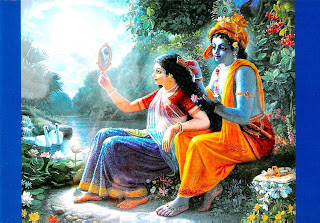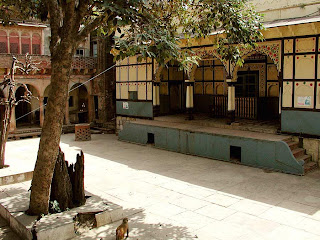Shringar Vat
 |
| Krishna is grooming Radharani's hair, Shringar Vat; |
Shringar Vata lies a little towards east from Imli Tal (in the direction of Keshi Ghat) on the banks of the Yamuna. A Banyan tree is called Vata in Sanskrit. The word Shringar means decoration. Thus, Shringar Vata, as the name suggests, means the Banyan tree where Krishna was decorated or the place where Krsna decorates Shrimati Radharani. Shringar Vata is also known as Nityananda Vata.
 |
| Shringar Vat; |
During the Rasa Dance, Krishna left the assembly of all the gopis (cowherd girls) and came here to this place, so as to be alone with Shrimati Radharani. With His own hands Krishna picked beli, chameli and other beautiful flowers that grew in the groves of Shringar Vata and personally decorated Shrimati Radharani’s hairs. There is a beautiful painting in the temple at this place depicting this historical, treasurable and worshipable pastime. This place signifies that the Supreme Absolute Truth, The Cause of all causes, appears in Vrindavan as a simple cowherd boy and becomes a servant to please Shrimati Radharani.
Krishna is only conquered by the love of His devotee.
 |
| Shringar Vat; |
Shringar Vata is also a very favorite pastime place of Shri Balaramaji. When Krishna and the gopas (cowherd boys) would herd cows along the Yamuna; Subala, Stoka-krishna, Shridama, Madhumangala, Arjuna, Ujjvala, Gandharva, all of these gopas would bring Krishna here and decorate His hair and His body with beautiful flowers, minerals, peacock feathers, gunja malas and other beautiful ornaments of the forest.
 |
| Nityananda Vat (Shringar Vat); |
During His stay here in Vrindavan, Shri Nityananda Prabhu (Incarnation of Balaramji in the age of Kali as the associate of Shri Chaitanya Mahaprabhu) spent few days here at Shringar Vata. Therefore, this place is also known as Nityananda Vata. Nityananda Prabhu performed His pastimes here as a cowherd boy in the mood of Balaramji. He would bathe, play games and splash waters in the waters of Yamuna at this place in the mood of a small child with the cowherd boys who were residing here at that time.